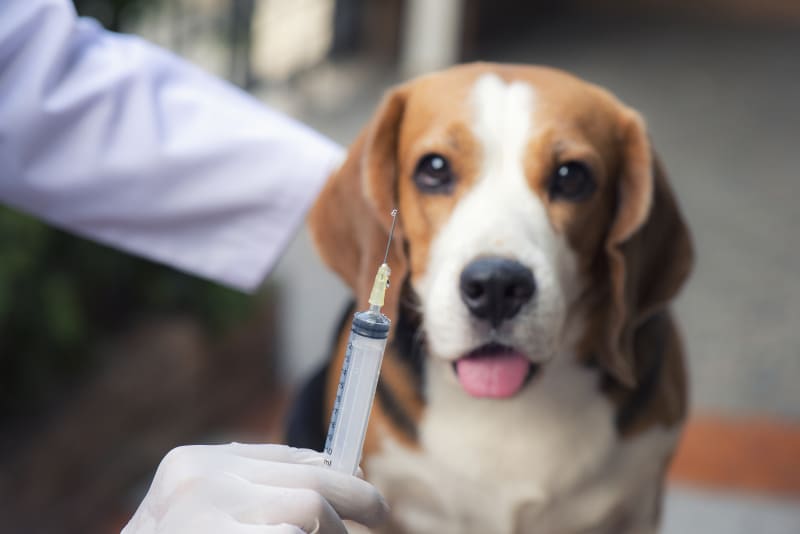
The Importance of Completing Your Dog’s Vaccination
Share
The Importance of Completing Your Dog’s Vaccination Schedule
As pet parents, one of the most important responsibilities we have is to ensure the health and well-being of our dogs. One of the key ways we can protect our furry friends is by staying on top of their vaccinations. Vaccines play a crucial role in preventing potentially deadly diseases, and completing your dog’s vaccination schedule is essential to ensure they are fully protected.
Why Are Dog Vaccines So Important?
Vaccinations are designed to help your dog’s immune system fight off harmful diseases by providing them with immunity to specific viruses and bacteria. Just like humans, dogs can contract various infectious diseases that can range from mild to life-threatening. Many of these diseases can be prevented through vaccines, reducing the risk of illness and ensuring your dog enjoys a long, healthy life.
Common Vaccines for Dogs
There are several core vaccines that are recommended for all dogs, regardless of their lifestyle or environment. These vaccines protect against the most common and serious diseases that dogs are likely to encounter. They include:
Distemper: Canine distemper is a highly contagious viral disease that affects a dog’s respiratory, gastrointestinal, and nervous systems. Without vaccination, distemper can lead to severe illness or death.
- Rabies: Rabies is a fatal disease that can affect both animals and humans. It is spread through the bite of an infected animal. Rabies vaccination is required by law in many areas, and it is essential for keeping both your dog and the community safe.
- Parvovirus: Parvovirus is a highly contagious virus that attacks the gastrointestinal tract and immune system. It is particularly dangerous for puppies, and without proper vaccination, it can be fatal.
- Hepatitis (Adenovirus): Canine hepatitis is a viral infection that attacks the liver and other organs. It can cause severe liver damage, kidney failure, and even death. Vaccination helps protect against this dangerous virus.
- Parainfluenza: This virus causes respiratory infections in dogs and is often a part of kennel cough outbreaks. While it’s not usually fatal, it can cause severe coughing and discomfort.
The Importance of Completing the Full Vaccination Series
The initial set of vaccinations for puppies generally begins at around 6-8 weeks of age, followed by booster shots every 3-4 weeks until the puppy is about 16 weeks old. These early vaccinations are critical because they help establish immunity during a period when puppies are most vulnerable to diseases.
It’s essential not to skip or delay these vaccinations, as incomplete vaccination schedules can leave your dog unprotected. Missing doses or not following through with booster shots may result in gaps in immunity, leaving your dog at risk for diseases.
For adult dogs, annual or tri-annual booster shots are typically needed to maintain immunity against certain diseases. Your veterinarian will be able to advise you on the appropriate timing for boosters based on your dog’s age, lifestyle, and the specific vaccines they received.
Protecting Public Health and Other Pets
In addition to protecting your own dog, completing their vaccination schedule also helps protect other animals and the broader community. Vaccines like rabies prevent the spread of deadly diseases to humans and other pets. Furthermore, keeping your dog up to date on vaccines helps minimize the spread of contagious diseases in dog parks, boarding kennels, and other public spaces where pets interact.
Vaccines and Travel
If you plan to travel with your dog—whether it’s a trip to a dog-friendly park or an international adventure—vaccinations are essential. Some areas have strict vaccine requirements for animals entering or leaving the country to prevent the spread of diseases. Additionally, certain destinations may require proof of rabies vaccination, especially if you're traveling to areas with a higher risk of disease transmission.
Why Skip the Vet Visit?
It’s easy to put off veterinary appointments or assume that your dog will be fine without a vaccination. However, skipping this vital part of your dog’s healthcare can have serious consequences. For example, parvovirus and distemper are diseases that can be deadly if contracted, and they are both highly preventable through vaccinations. The cost of treating these diseases can far exceed the cost of vaccinations, not to mention the emotional toll of seeing your dog suffer.
By staying on top of your dog’s vaccinations, you’re investing in their health and ensuring that they can lead a happy, healthy life with minimal risk of serious illness.
Conclusion: A Healthier Future for Your Dog
Vaccinations are one of the most important steps you can take to protect your dog from serious diseases. Whether you have a young puppy or an older dog, keeping up with their vaccinations is a simple yet powerful way to safeguard their health. In addition to protecting your dog from common illnesses, completing their vaccination schedule also helps protect other animals and the community at large.
If you have questions or concerns about your dog’s vaccination needs, talk to your veterinarian. They can provide personalized advice based on your dog’s breed, age, and lifestyle. After all, your dog’s health and happiness are worth every vaccination.
Stay tuned for more pet care tips and advice!
